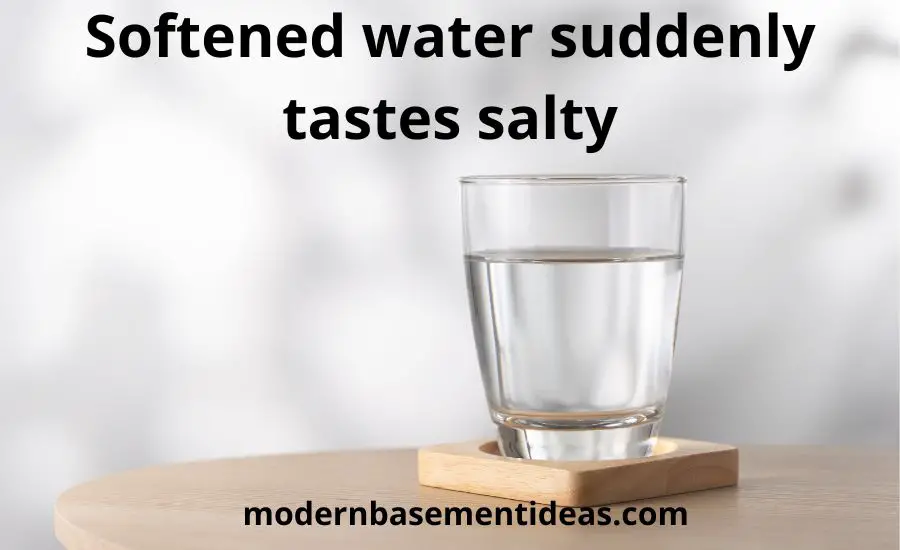Many house owners rely on water softeners to soften their water, making it more pleasant for consumption and other domestic needs.
However, an unexpected phenomenon has left some individuals puzzled: softened water taste salty. This peculiar situation has raised questions among homeowners, requiring an exploration into the causes behind this unusual occurrence.
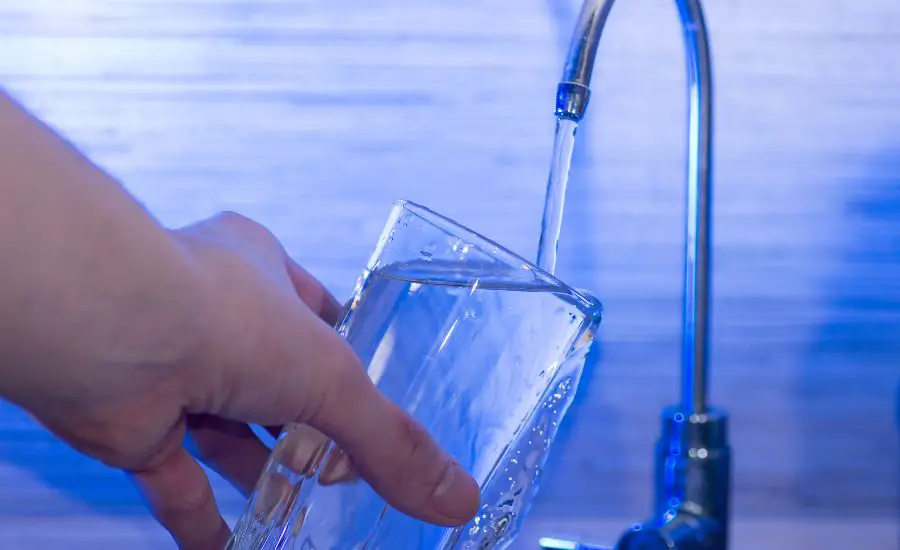
Contents
- 1 The Most Prevalent Sources Of Salty Water:
- 2 Why Does Water Taste Salty?
- 3 The Impact Of Sodium Ions
- 4 Inadequate Water Softener Settings
- 5 Contamination Or Malfunctioning System
- 6 Source Water Composition
- 7 Corrosion In The Plumbing System
- 8 Temperature And Evaporation Effects
- 9 Drain Line Flow Control
- 10 The Role Of The Brine Cycle Solution
- 11 The Importance Of Proper Regeneration Cycles
- 12 The Source Of Water For Consumption And Its Salinity
- 13 Addressing The Issue
- 14 FAQ
- 15 Conclusion
The Most Prevalent Sources Of Salty Water:
- Formation of a salt bridge
- Water softener regeneration error
- High sodium water
- Brackish water contamination
- Insufficient rinse cycle
- The water softener not working
- Wrong salt calibration
Why Does Water Taste Salty?
To understand why water tastes salty, you must first understand the fundamentals of water softening.
Hard water has high levels of minerals such as calcium and magnesium, which can cause limescale accumulation in pipes and appliances.
Water softeners eliminate these substances via an ion exchange process, which typically involves replacing them with sodium ions. Since minerals do not encourage limescale buildup, “soft” water is created, which is kinder to pipes and generates a more effective lather with soaps and detergents.

The Impact Of Sodium Ions
Some people may detect that soft water tastes salty due to the presence of sodium chloride ions. Sodium itself is a mineral, and in moderate quantities, it is generally considered safe for consumption.
The threshold for detecting saltiness in water is relatively low, which means even a slight increase in how much sodium levels are in, can become noticeable to sensitive palates. As a result, some individuals might perceive that water tastes salty, especially when compared directly to not salty water.
Inadequate Water Softener Settings
Water softener settings are critical in determining the quantity of salt injected throughout the ion exchange process. If the water softener setting is too high, it can increase the salt content of the treated water, resulting in too much salt in the drinking water.
Manufacturers often prescribe certain settings depending on water hardness levels, and wrongly modifying these water softener settings might result in the issue of salty water. As a result, it is critical to ensure that the water softener is properly designed to strike the proper balance between soft water and salt concentration.
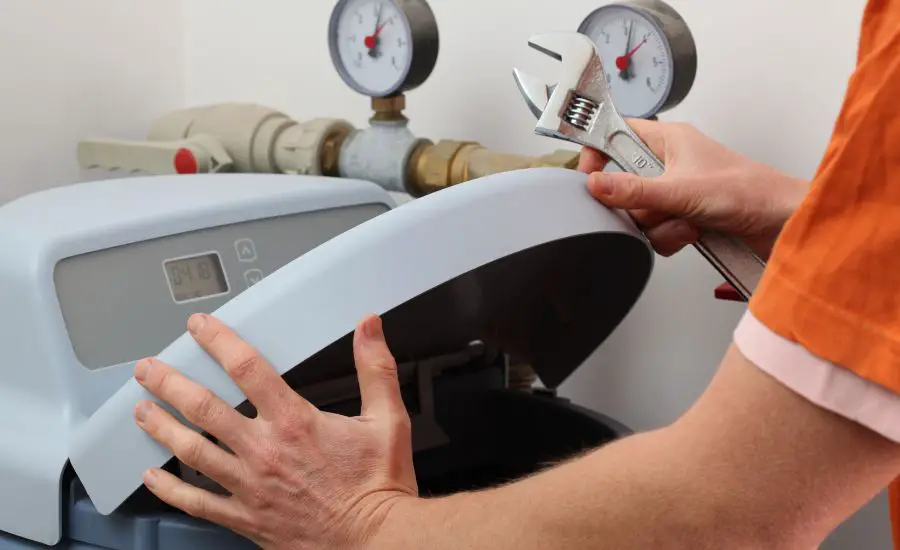
Contamination Or Malfunctioning System
In rare cases, a sudden salty taste in the water supply may indicate a faulty or polluted water softener system. Problems such as a broken resin bed, a faulty brine tank, or cross-contamination of brine and softened water can contribute to high salt levels and a salty taste.
To avoid such problems and to ensure the production of consistently high-quality soft water, the water softener system must be maintained, examined, and cleaned regularly.
Source Water Composition
Apart from the water softener itself, the composition of the source water can also influence the salty water taste.
If the source water has a lot of salt, the water softeners might increase this presence, which results in a more pronounced salty taste.
Similarly, if the source water contains other minerals or impurities, the interaction between these substances and the water softener can produce unexpected flavors, altering the softened water taste salty.
Corrosion In The Plumbing System
Corrosion within the plumbing system can introduce additional minerals or salts into the water, altering its taste. If the water passes through corroded pipes or fixtures, it may pick up these contaminants and develop a salty flavor.
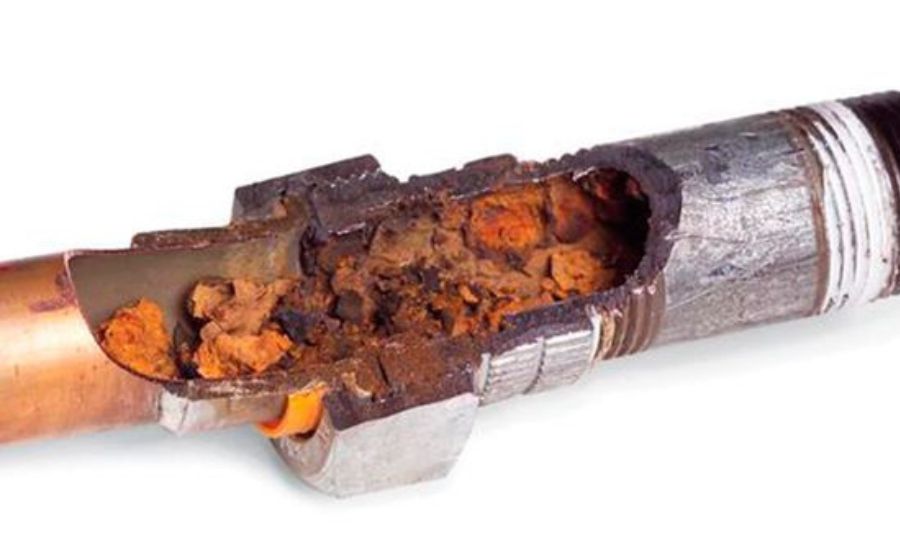
Temperature And Evaporation Effects
Salty water can also be influenced by temperature and evaporation. As water softeners are heated or left exposed to air, some water molecules may evaporate, leaving behind a higher concentration of minerals and ions. This can intensify the taste of sodium in the water, giving it a salty taste.
Drain Line Flow Control
The drain line is an essential component of a water softener system since it provides for the disposal of wastewater generated while the regeneration process. During the regeneration process, a drain line flow control device is often installed to change the flow of the drain line.
This control mechanism, such as the drain line, ensures proper flushing of the resin bed and prevents any potential backflow or overflow issues that could contribute to the salty-tasting water.
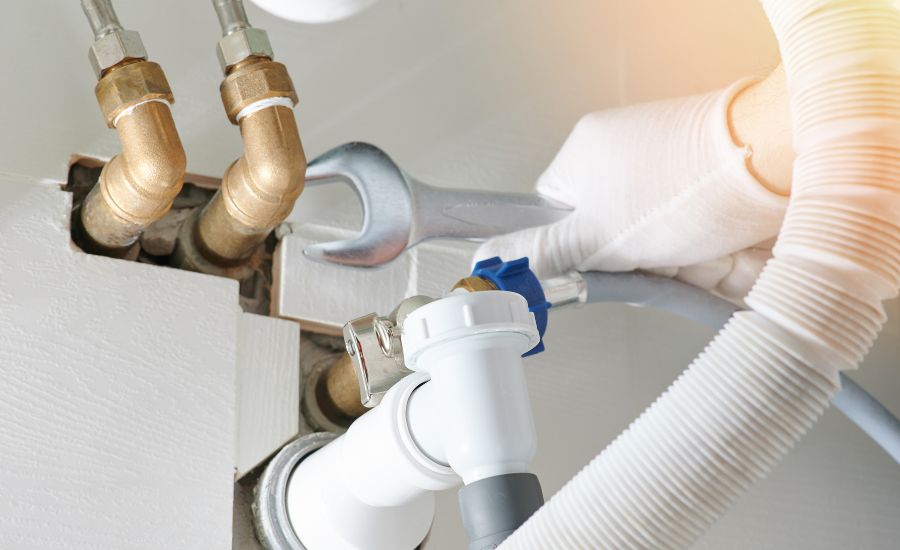
The Role Of The Brine Cycle Solution
Because it regenerates the resin bed, the brine solution is critical in the water-softening process.
The brine cycle solution, which is often a concentrated salt water solution, is used to remove the calcium and magnesium ions that have accumulated on the resin beads.
During the regeneration process, the brine solution replaces the hard minerals, and salty water drains away.
The Importance Of Proper Regeneration Cycles
A water softener’s regeneration cycle is intended to replenish the resin bed and remove accumulated hardness minerals from drinking water. It is critical to adhere to the regeneration schedule suggested by the water consumption and hardness levels.
Deviating from the suggested cycle can result in incomplete rinsing of the brine solution, leading to higher sodium levels and water that taste salty.
The Source Of Water For Consumption And Its Salinity
If the softening process uses tap water that is already high in sodium, the regeneration process may elevate the sodium levels even more, resulting in salty softened water. Furthermore, the mineral composition of the source water, such as calcium and magnesium levels, may have an impact on the overall flavor profile of water.
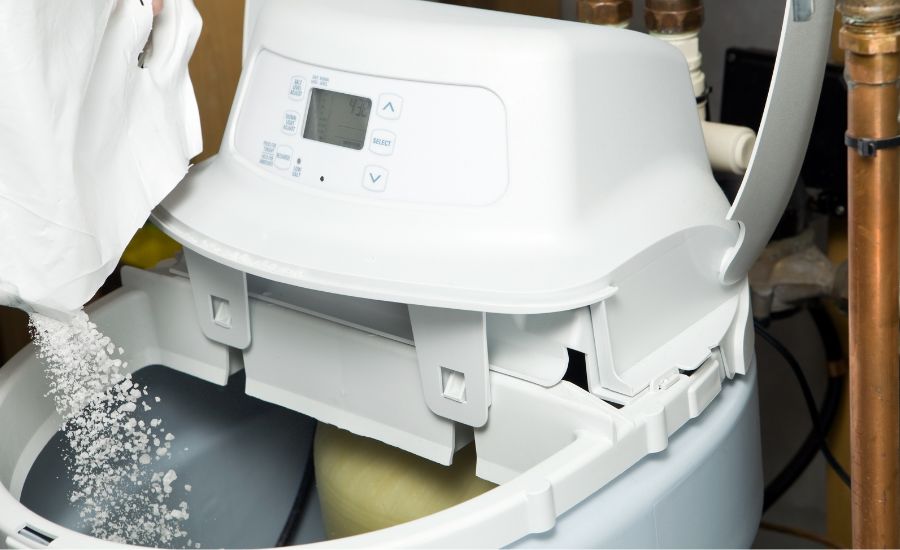
Addressing The Issue
If your drinking water tastes salty, you have various options for investigating the problem.
Water softener settings
Check the water softener settings first to ensure they are appropriately calibrated based on water hardness levels. Consult the manufacturer’s instructions or seek expert assistance if necessary to change the settings. A water softener should be regularly maintained and cleaned to prevent malfunctions or contamination.
Seeking professional help
If the problem persists or you have concerns about the water softener system, contact a licensed plumber or water conditioning specialist. These professionals may evaluate the system, detect any issues, and provide appropriate remedies.
They may test the source water, inspect the resin bed, inspect the brine tank, and do additional diagnostics to determine the source of the salty taste in the soft drinking water.
Alternative water treatment methods
If consumers find the taste of water unpleasant or overly salty, other water treatment processes may be investigated. Reverse osmosis systems, for example, may effectively remove minerals and ions from water, including sodium, resulting in clean, neutral-tasting drinking water.
It is important to research and select the most suitable water treatment option based on personal preferences, water quality, and budgetary considerations.
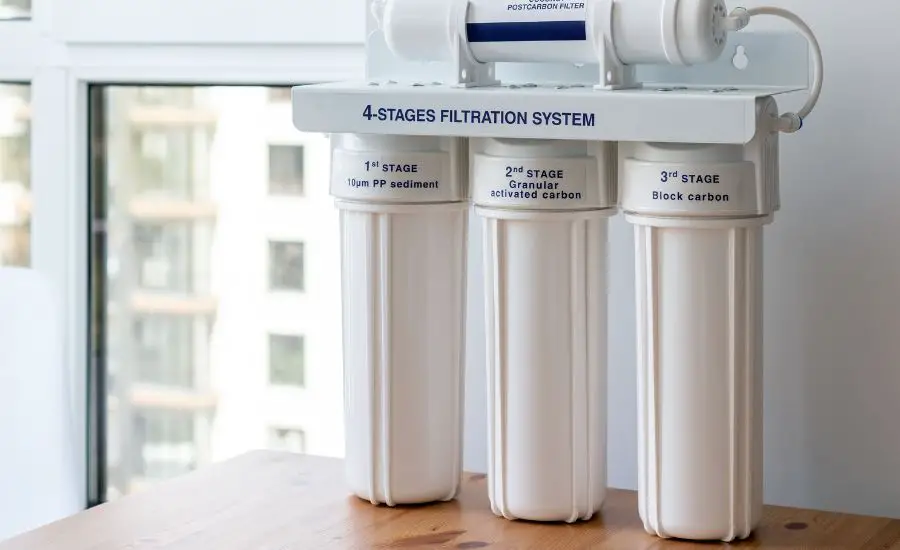
Managing sodium levels in softened water
The primary cause of the yucky salty water taste in water is the presence of sodium ions. When the water softener regenerates, the brine solution is introduced into the mineral tank, replacing the hardness minerals with sodium.
Excess sodium can stay in the resin bed if the brine solution is not thoroughly washed from it during the regeneration cycle, resulting in a nasty salty water flavor.
Monitoring the brine line and brine valve
To guarantee that no excess salt enters the softened water supply, inspect the brine line and brine valve. The brine line takes the brine solution from the brine tank to the mineral, and the brine valve controls the flow of the brine solution during the regeneration cycle.
Regular inspection and maintenance of these components help maintain proper operation and prevent excessive salt introduction into the system.
Considering alternative water treatment methods
For individuals who are particularly sensitive to sodium or are on a low-sodium diet, alternative water treatment methods may be worth considering.
One such approach is a reverse osmosis water filter, which employs a semi-permeable membrane to remove pollutants.
After a water softener is installed, a reverse osmosis system may be utilized to further filter the water, assuring a low salt level and neutral flavor.
Maintaining the mineral tank and salty water drain line
The mineral tank must be maintained regularly to ensure that it performs optimally in eliminating hardness minerals. Cleaning or replacing the resin bed as needed helps to preserve the water’s quality and avoids the formation of a continuously salty water flavor.
Managing water sodium levels
Excess salt in water can harm the plumbing system. Sodium is a corrosive agent, and prolonged exposure to high sodium water may cause corrosion and degradation of pipes, fittings, and fixtures.
Monitoring and managing sodium levels in the water supply not only help maintain a pleasant flavor but also protect the integrity and longevity of the system.
Troubleshooting brine system components
If the softened water persistently tastes salty despite maintenance and operation, particular brine system components may need to be troubleshooted. The brine elbow, brine piston, and other brine system components should be evaluated for evidence of dysfunction or obstruction. Addressing these issues immediately assists to eliminate the salty taste of water.
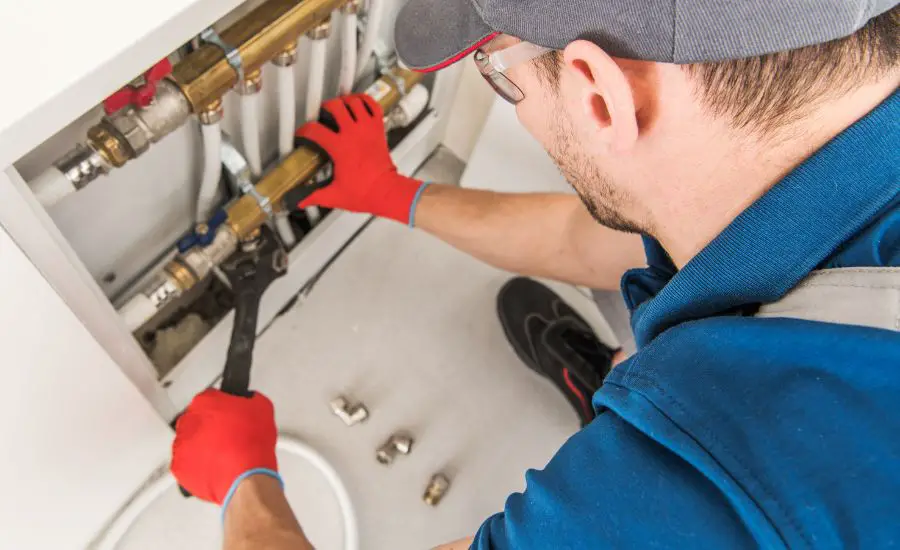
FAQ
If you have any questions about water taste salty, they’re answers to them.
Why does my water taste salty after my water softener regenerates?
Although water softeners are meant to lower the number of minerals that cause hardness, the regeneration procedure can occasionally add sodium ions into the water, leading to a salty taste. If the brine solution used to replace the water softener is not entirely washed from the resin bed, the water will have a salty flavor. As a result, more sodium may stay in the water, making it taste salty.
Is softened water too salty to drink?
Softened water should not have an aftertaste of salt if kept and regulated appropriately. Individuals who are extremely sensitive to sodium, on the other hand, may perceive a slight saltiness in water. To guarantee a nice flavor, it is important to monitor salt levels and alter the water softener parameters regularly.
Alternative water treatment processes might be investigated further to address the problem of salty water taste. For example, including a reverse osmosis system after the water softener can help reduce the level of salt and pollutants.As a result, softened water with a more neutral flavor and less salty taste is produced.
This can be particularly beneficial for individuals who are on a low-sodium diet or prefer water with minimal taste alteration.
Why does water from softener taste weird?
If water continually possesses a salty taste, the brine cycle length should be reviewed to ensure that enough time is available for washing the resin beads. This will aid in the removal of extra salt water and the reduction of sodium levels in the water.
Water delivered by a water softener may be deemed weird due to the amount of salt introduced during the softening process. This change in mineral content may affect the flavor of the water, making it taste salty. The unusual flavor might be caused by a variety of factors, including the composition of the source water, incorrect settings, or system malfunctions.
It’s important to note that the perception of taste can vary among individuals. While some may find the flavor of residual sodium water is extremely saline, others may not detect it as strongly. Personal taste preferences can influence how people perceive softened water tasting salty.
Conclusion
When water that has been softened tastes salty, it can be unsettling for homeowners that depend on water softeners. While soft water is more pleasant and healthy, the addition of sodium ions throughout the procedure may result in a little salty flavor.
This phenomenon can be caused by a variety of factors, such as incorrect water softener settings, system faults, source water composition, individual taste sensitivity, and temperature influences. People can solve this problem and continue to enjoy high-quality soft water.

